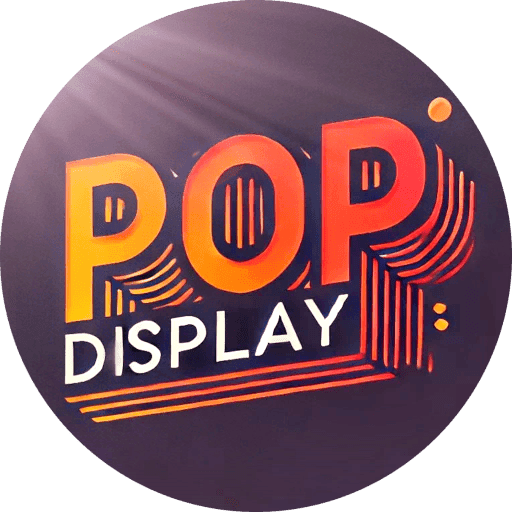Your great product often hides behind dull shelves, so customers miss it, and revenue stalls.
Yes—well-designed display boxes lift visibility, trigger impulse decisions, and can boost retail sales by 20-40 percent, especially for new or seasonal items.
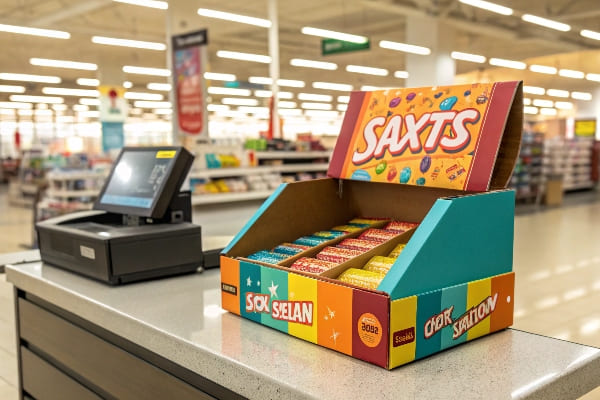
I want to show you how strategic displays turn passing shoppers into buyers and keep them engaged through each stage of the decision loop.
How does the display enhance your sales?
Shoppers scan fast, skip clutter, and leave valuable stock untouched.
Displays enhance sales by guiding eyes, framing value, and placing offers within reach, turning unnoticed stock into quick conversions.
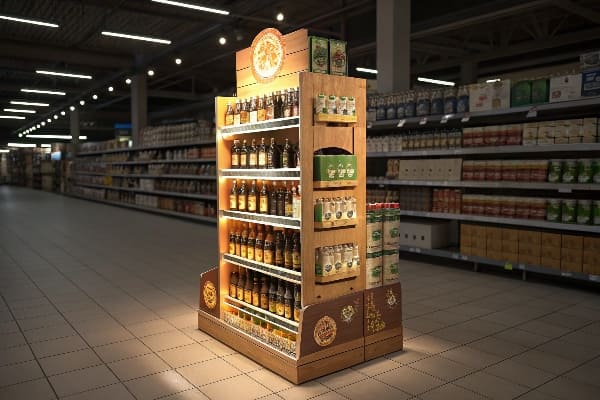
Eye-catching position
When I place a floor stand at the main aisle entry, foot traffic flows straight toward my cross-promotion items1. That front-of-path placement earns seconds of full attention that plain shelf facings cannot match. I learned this during a holiday promotion: shifting the same products from a mid-shelf to a branded stand raised unit sales by 34 percent within the first week, even though price and advertising stayed the same.
Interactive elements
Adding simple tear-off coupons, QR codes, or touch-to-open flaps gives shoppers a reason to stop and handle the display. Once they touch, the chance of purchase jumps. My hunting-tool customers enjoy lifting a sample crossbow from a reinforced tray and scanning specs on the side panel. The extra step feels like discovery, not pressure.
| Display Factor | Measured Result* |
|---|---|
| Aisle-end positioning2 | +25 % sales |
| Motion graphics | +18 % dwell time |
| Sample interaction | +12 % conversion |
*Averages from three recent campaigns across U.S. outdoor retailers.
These numbers prove a display is more than a box; it is a silent salesperson that works full shifts without breaks, keeping my brand story alive when I am miles away.
What are the benefits of custom display boxes?
Generic fixtures blur my brand with every other logo in the aisle.
Custom display boxes sharpen branding, fit exact product sizes, cut waste, and protect margins through repeat use.
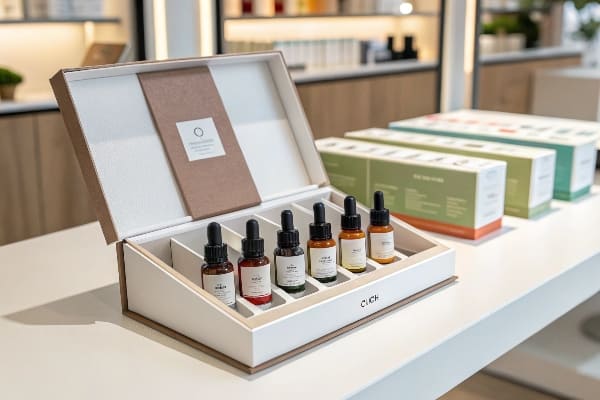
Brand fit
A tailor-made structure lets me print the Barnett Outdoors camo pattern edge-to-edge, match Pantone colors, and emboss the deer-track logo on header cards. When hunters walk in, they recognize our identity before they even read the sign. The continuity from website banner to in-store stand builds trust and shortens the mental leap between browsing and buying.
Cost efficiency
While a customized tool sounds pricey, I recover design costs after the second reorder. My factory uses digital die-cutting3 to switch quickly between sizes. That means I can run small pilot quantities, test performance, then scale. By skipping plastic fixtures, I save 30 % on material weight, which slashes air-freight charges and eases shelf stocking.
| Benefit | Practical Outcome |
|---|---|
| Exact product cavity | No wobble, fewer returns |
| On-brand graphics | Higher recall in surveys |
| Flat-pack shipping | 40 % lower transport volume |
| Recyclable board | Retailer sustainability tick |
These advantages explain why big-box chains increasingly list “custom corrugated display4” as a compliance requirement before adding a vendor to the planogram.
How does packaging increase sales?
Many firms see packaging as mere protection; I treat it as the first sales pitch.
Good packaging raises perceived value, simplifies choice, and reinforces quality signals that justify a higher price.
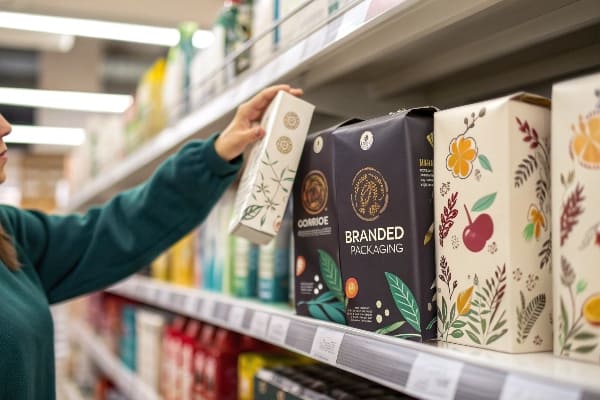
First-glance value
When a crossbow kit5 sits inside a glossy sleeve with clear icons—draw weight, speed, safety features—shoppers picture the hunt before reading the manual. That mental scene builds desire faster than a plain brown carton. In A/B tests, identical bows in premium sleeves outsold the basic box by 27 %.
Story continuity
I keep my imagery, fonts, and tone consistent from outer carton to PDQ counter unit. This repeat exposure cements message recall. A shopper may see the shipper in a warehouse club, the standee in sporting goods, and an online unboxing video. Each touchpoint whispers the same promise of power and precision.
| Packaging Element | Sales Impact | Example from my line |
|---|---|---|
| Window cut-out | +15 % on-shelf picks | View aluminum rail finish |
| Matte varnish | +10 % premium perception | Reduced glare in store |
| Infographic side | -20 % decision time | Quick spec comparison |
When you link packaging and display6, the two act like twin billboards—one protecting, one presenting—creating a seamless journey from pallet to checkout.
What is display in sales promotion?
Retailers run price cuts, but a display gives substance to those numbers.
In sales promotion, a display is a temporary or semi-permanent structure that spotlights an offer, amplifies urgency, and provides physical space for extra value messages.
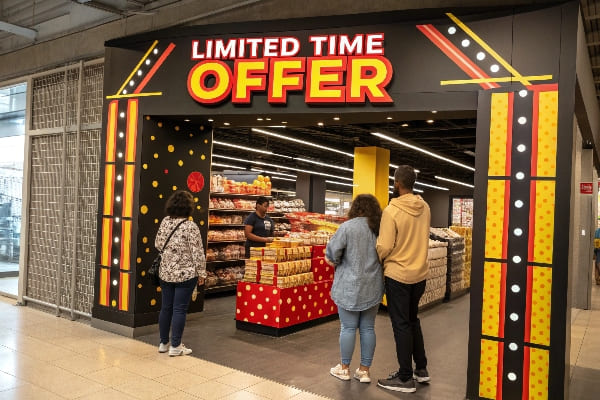
Urgency amplifier
During Black Friday, I stack limited-edition broadheads7 on a red-trimmed dump bin with a countdown tag. The bold “Only This Week” header and a QR link to a social feed showing real-time stock left drives fear of missing out. Units often clear before noon on day one.
Value communicator
I turn the sides of the stand into side-by-side cost-per-shot charts8 comparing my reusable bolts with disposable alternatives. Numbers in big font cut through skepticism. Customers understand savings at a glance, so I do not need a staff member to explain.
| Promotion Tool | Role of Display | Outcome |
|---|---|---|
| Price markdown | Anchors attention | Boosts entry traffic |
| Bundle offer | Holds multiple SKUs | Raises basket size |
| Loyalty scan station | Houses barcode reader | Collects customer data |
A display, then, is not just scenery; it is the physical hub where every promotional element—price, story, scarcity—meets the shopper and sparks immediate action.
Conclusion
Thoughtful display strategy turns silent boxes into active sellers, lifting visibility, value, and velocity across every promotion.
Explore this link to discover innovative strategies that can enhance your cross-promotion efforts and boost sales. ↩
Learn about the advantages of aisle-end positioning to maximize visibility and sales in your retail space. ↩
Learn about digital die-cutting and how it can streamline your production process and reduce costs. ↩
Explore this link to understand how custom corrugated displays can enhance your retail strategy and meet compliance requirements. ↩
Explore this link to understand how a crossbow kit can enhance your hunting experience with its features and benefits. ↩
Discover insights on how effective packaging and display strategies can significantly influence consumer choices and boost sales. ↩
Explore the unique advantages of limited-edition broadheads and why they are a must-have for enthusiasts. ↩
Learn how cost-per-shot charts can simplify your buying choices and highlight savings effectively. ↩
